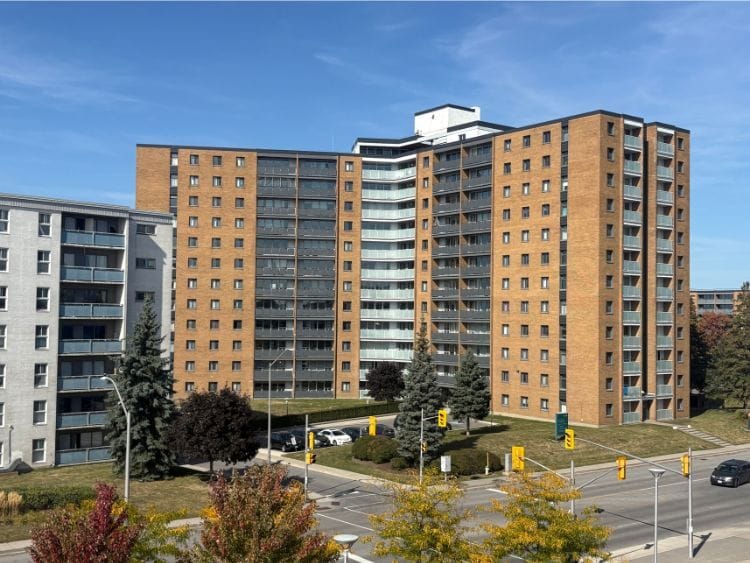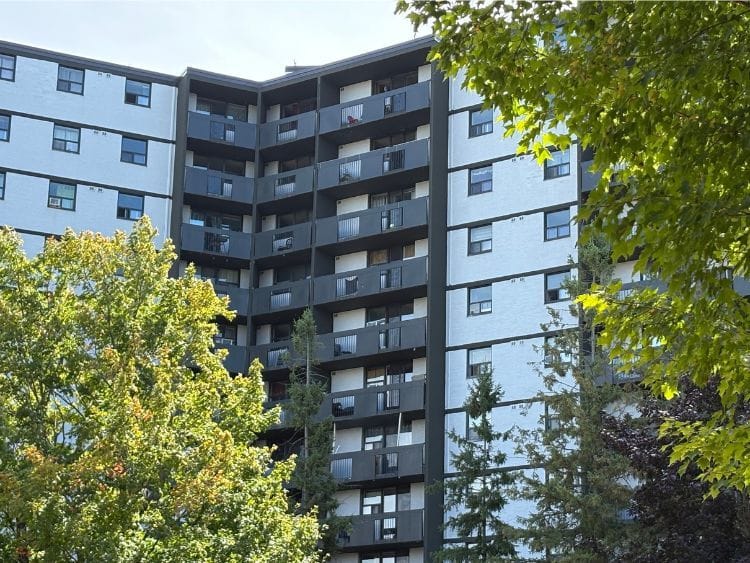Imagine it’s a hot summer day. The heat is sweltering as you try to cool down in your hot apartment. It is a reality many Ottawa renters face, especially in older buildings that were constructed before heat pumps or central air conditioning were the norm for rentals.
But one local MPP is looking to change that.
Newly elected Ottawa Centre NDP representative Catherine McKenney intends to bring a motion to Queen’s Park this fall that would establish a maximum temperature of 26 C that landlords must ensure their units do not exceed.
Currently, landlords are not required to provide cooling in the summer like they are with heat in the winter.
“For starters, if somebody wants to install an air conditioning unit safely, a landlord cannot prevent them from doing so. But today, that does happen,” McKenney told the Lookout.
In 2023, the Doug Ford-led Progressive Conservatives passed the Helping Homebuyers, Protecting Tenants Act, a bill that would allow tenants to install their own window or portable air conditioner without their landlord being able to tell them no. Bill 97 received royal assent, but the provision around AC units was never implemented.
“People die from excessive heat. It is especially dangerous for seniors, for people with disabilities, and for young children. And, you know, essentially what I'm saying is landlords should be responsible to keep their units at a maximum temperature of 26 degrees,” said McKenney.
While the province of Ontario does not collect data on heat-related deaths, Statistics Canada does. It found that between 2000 and 2020, there were 670 more deaths than usual recorded in the country's 12 largest cities during periods of extreme heat that lasted two days or longer, according to CBC.
This year it was a particularly hot summer in Ottawa with long periods of extreme temperatures, heat warnings and droughts. Even June broke records with a temperature of 35 C on June 23, which was higher than the previous record of 34.4 C set in 1921.
The scorching temperatures have inspired tenant advocacy group ACORN Ottawa to also fight for a heat bylaw. A report from the organization found that around half of low-to-moderate income tenants lack air conditioning, with affordability as the root cause. Out of all respondents, 54 per cent said extreme heat was their top housing issue.
“I asked (my landlord) to replace the AC in my unit because it’s too old, but they wouldn’t replace it. Because it’s so inefficient, it has to be kept running all the time and I end up paying a much higher hydro bill,” an Ottawa ACORN member said in a press release. “They should change the AC unit but they won’t and it’s extremely hot with repeated heat waves.”
Ottawa ACORN member Hassan Youssouf told the Ottawa Lookout that negative health effects – particularly for seniors or those with disabilities – were also a concern. Not everyone is mobile enough to visit a mall or other air-conditioned space to cool down, he said.
“The climate crisis is here and we see heat waves every summer. That is a big issue for neighbours who want to stay in their apartments and they cannot sleep at night because it's too hot. Some people work at night and have to sleep during the day. It causes a lot of health issues,” said Youssouf. “We need all levels of government to work together so that the responsibility falls on the landlords and not the tenants.”

Residents in apartment buildings without air say they cannot sleep and that the heat is causing negative health consequences. Photo by Charlie Senack.
What are other provinces and cities doing?
Across Canada no province forces all landlords to provide air conditioning. British Columbia mandates that any ventilation or cooling systems must be maintained and in good working order. The 2024 BC Building Code requires that all newly constructed homes have at least one living space that is designed not to exceed 26 C under summer design conditions. Vancouver also approved a bylaw that new residential buildings over three storeys must have active mechanical cooling capable of keeping the interior at or below 26 C when the windows are closed.
Quebec has laws that require rental units to be in a safe and habitable condition. Prince Edward Island requires properties to meet a “minimum standard of fitness for habitation.”
In the United States, some areas, especially those that face dangerous heat temperatures, have maximum heat requirements. Phoenix, Arizona has laws which require rental units to be below 82 F in the daytime and 86 F at night. In Texas, public housing authorities must provide cooling. Air conditioning is also required in Las Vegas, Nevada where landlords are required to provide “habitable conditions.”
Some other parts of the world like France, Spain and Italy are also setting maximum indoor temperature standards after recent heat waves. And in the United Arab Emirates like Dubai and Abu Dhabi, air conditioning is considered an essential, basic service.
McKenney said she hopes it will one day become the law in Ontario that it’s up to the landlords to provide air conditioning in some form.
“If you own a building or an apartment, you have to provide heat. You cannot allow it to go below 20 C,” noted McKenney. “So why is it any different for maximum temperature? You can always put one of those floor units in for example. They used to be much more expensive, but they've come down in price now.”




